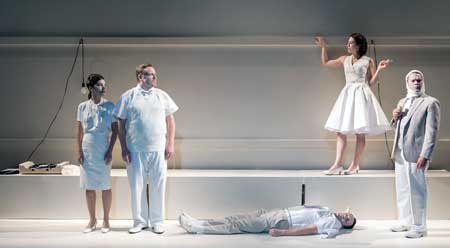Play (1602)
by William Shakespeare
The Nora Theatre Company
in association with Bedlam
Central Square Theater, Central Square, Cambridge, MA
June 10 – July 9, 2016
With Kelley Curran, Edmund Lewis, Susannah Millonzi, Tom O’Keefe, Eric Tucker

Kelly Curran, Edmund Lewis
in Bedlam’s “What You Will”
Photo: A.R. Sinclair Photography
Courtesy of Central Square Theater
The troupe of five actors known as Bedlam, with somewhat different casting, had performed Saint Joan at the Central Square Theater last year to considerable acclaim and they return this year with an interesting gambit – two different productions of the same Shakespeare comedy done in two different ways by the same actors, running more or less in conjunction with one another. This version of Twelfth Night is specifically entitled What You Will, the play’s alternate title as given by the Bard, to distinguish it from the other production which they are titling Twelfth Night.
Here, the five actors play the whole raft of characters in Shakespeare’s delightful comedy, and at times one can follow what they’re doing. The whole endeavor is pretty interesting, so, even if one doesn’t follow the whole plot from watching this production, one can have a good time getting the general sense of it and enjoying the general antics and the offbeat interpretations.
Everything having to do with sets and costumes starts out white in this show, providing a kind of blank canvas on which a lot of literal paint, mostly reddish, gets swiped and applied. (There is also one application of yellow paint to simulate the yellow stockings that Malvolio puts on in his vain attempt to attract Olivia’s interest.)
The two women of the troupe – Kelley Curran and Susannah Millonzi – are particularly compelling in their multiple roles. Curran plays Olivia and a bunch of other stuff, and Millonzi Viola and a bunch of other stuff too. The three men, Edmund Lewis, Tom O’Keefe and Eric Tucker, who directs the production, are also rambunctiously devoted to multiple roles, but in this production the women stand out more vividly. Of course, it is a woman’s play, the principal moral and dramatic force arising in the character of Viola, so that makes sense. (In an innovative twist in the alternate production, Twelfth Night, men get to play Viola.)
The basic plot is relatively easy to get – Viola comes ashore on Illyria and sets herself up as the cross-dressed manservant of Orsino. Viola falls in love with Orsino, who is in turn pursuing Olivia. But Olivia takes a shine to Cesario, Viola’s cross-dressing counterpart, instead. At some point, Sebastian, Viola’s twin brother who she thinks has been lost at sea, turns up on Illyria, and looking just like Cesario, gets into a confusing mess with Olivia who thinks he and Cesario are the same person. Meanwhile, Viola is still in love with Orsino who still thinks she’s Cesario, though he’s gradually taking an unexpected shine to him(her).
There’s a whole second layer of plot related to Sir Toby Belch and Sir Andrew Aguecheek and their retinue, including Maria the maid, and Feste the clown; there are plenty more characters to make added complexity, particularly when five actors are playing them all and switching off at rapid pace.
In some productions which use few actors to play multiple roles – Actors’ Shakespeare Project does this all the time – there is some greater attempt to distinguish the roles clearly enough for the audience to follow. That’s not as much the case in this particular production. If you know the play well, you can guess pretty well who is who, but if you don’t it will be very difficult.
Despite that, there are some great theatrical moments, notably a terrific sleight of hand gag that features two actors pretending to pass a cigarette the full length of the stage. It is beautifully done and wonderfully entertaining.
Otherwise, there are some long intermezzos for music and other things which do provide a somewhat unusual and unexpected attenuation in the action, and which seem, in the longer run, to waste some of the precious time that might have otherwise been used to help clarify what was going on. The play has been cut to an hour and forty-five minutes without intermission already, so those extended moments seem not the greatest choice.
Overall, this is an abstract though interesting take on Shakespeare with some great staging ideas and some compelling moments of acting, that overall needs something additional to really convey a sense of the play itself.
– BADMan
Leave a Reply